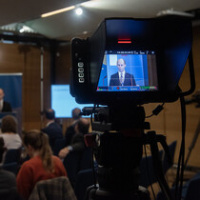Előadóülést tart az MTA Közoktatási Elnöki Bizottsága
Az MTA Közoktatási Elnöki Bizottsága az oktatás legfontosabb kérdéseit középpontba helyező előadássorozatot indít “The Future of Education in a Knowledge-Rich Society” címmel. A nyitóelőadást Andreas Demetriou professzor, a Ciprusi Tudományos Akadémia elnöke tartja "Educating the developing mind in a world of highly distributed intelligence: Can our schools cope?" címmel 2021. október 14-én 14:00 órakor, az MTA Székház Felolvasótermében.

A Közoktatási Elnöki Bizottság előadássorozatának első előadója Andreas Demetriou professzor, a Cyprusi Tudományos Akadémia elnöke.
A program meghívója olvasható itt.
Educating the developing mind in a world of highly distributed intelligence: Can our schools cope?
The talk will evolve in three sections. In the first section we outline current knowledge about the developing human mind. This section first summarizes psychological, brain, and genetic research on its architecture, specifying the fundamental processes enabling understanding, problem-solving, and decision-making and the constraints imposed on its functioning. We then summarize research on the development of the human mind, from infancy through early adulthood. We show that development advances through several levels of mastering control of the person’s interactions with the world: it goes from interaction control in infancy to executive and representational control in preschool, to inferential and resource management control in primary school to truth control and life options control in adolescence to control of life-important decision making and problem solving in early adulthood. In the second section we outline the educational implications of this model. In this section we show how each level of control frames what can and what cannot be learned at each school level, from preschool to university. We then point to weaknesses in European education caused by divergences between this knowledge and dominant educational practices coming from the past. The third section focuses on the changes which emerge in the recent years in the availability of tools delivering knowledge, evaluation of information, and problem solving to everyone, such as search engines, big data bases, and machine learning and simulations. We then summarize evidence on how these possibilities are used from as early as preschool through adulthood. We explicate why our schools, in their present organization and orientations, cannot cope with the knowledge emerging in the mind sciences or the technological advances in the knowledge and though industry above. In many respects, our schools are trapped in the world of early 20th century. Finally, we suggest changes needed in education to enable education to capitalize on this knowledge to educate the citizen of the second half of 21st century.
Andreas Demetriou
Andreas Demetriou is Professor Emeritus of Psychology of the University of Nicosia, Cyprus, since 2011. He is the current President of the Cyprus Academy of Sciences, Letters, and Arts, and he is also a fellow of Academia Europea, and the International Academy of Education and the Association of Psychological Science. He was the Minister of Education and Culture of Cyprus (2008-2011) and also the President of the National Research Council of Cyprus (2012-2015).
He studied psychology at the Aristotle University of Thessaloniki, where he received both his BA (1975) and his PhD (1983) and the University of New South Wales (1978), Australia. He was a professor of developmental psychology at the School of Psychology of Aristotle University (1975-1996) and Professor of psychology at the University of Cyprus (1996-2008). He served in many top academic or administrative positions, such as Vice-Rector and Acting Rector of the University of Cyprus (1999-2002), founding President of the Cyprus University of Technology (2004-2008), and President of the Conference of Rectors of the Universities of Cyprus (2006-2008). He was also the Minister of Education and Culture of the Republic of Cyprus (2008-2011).
He is an Honorary Doctor of Middlesex University London and an Honorary Professor of Durham University, UK and the Northeastern Normal University, China. He is a member of many learned societies, including the European Association for Research on Learning and Instruction, the International Society for the Study of Behavioral Development, the Society for Research in Child Development, and the Association for Psychological Science.
He served as editor or board member of many journals, including the Advances in Learning and Instruction. Learning and Instruction: The Journal of the European Association for Research on Learning and Instruction. Developmental Science. Cognitive Development. and the British Journal of Educational Psychology. He was also the founding editor of Psychology: The Journal of the Hellenic Psychological Society.
He taught as Visiting Fellow or Professor at several Universities, including the Universities of Porto, Portugal, Lublijana and Marribor, Slovenia, Fribourg, Swirzerland, and the University of Melboune, Australia, and lectured as invited lecturer for technical seminars on cognitive development at more than 50 Universities all over the world, including the Universities of Stanford, Harvard, Yale, McGill, Toronto, Munich, Leiden, Gothenburg, Wurtzburgh, Edinburgh, Leuven and Durham.
He has published more than 200 books and articles in scientific journals presenting his work on cognitive development and related applications. His last book, Growing minds (with George Spanoudis), presented his theory of cognitive development in detail. The journals New Ideas in Psychology (1998), Developmental Review (1999), Developmental Science (1999), and Intelligence (2014) devoted special issues in the discussion of his theory of cognitive development and its relations to general theory of intelligence. Ηe (with G. Spanoudis and A. Mouyi) published an article in Educational Psychology Review titled “Educating the developing mind: Towards an overarching paradigm” (2011), which elaborates on the implications of cognitive developmental science for education. The educational applications of his work are presented in a booklet jointly published by the UNESCO International Bureau of Education and the International Academy of Education in the educational practices series (Understanding and facilitating the development of intellect, Series-26).
Selected Publications
Demetriou, A., Efklides, A., & Platsidou, M. (1993). The architecture and dynamics of developing mind: Experiential structuralism as a frame for unifying cognitive developmental theories. Monographs of the Society for Research in Child Development, 58 (5, Serial No. 234).
Demetriou, A, & Kazi, S. (2001). Unity and modularity in the mind and the self: Studies on the relationships between self-awareness, personality, and intellectual development from childhood to adolescence. London: Routledge.
Demetriou, A., Christou, C., Spanoudis, G., & Platsidou, M. (2002). The development of mental processing: Efficiency, working memory, and thinking. Monographs of the Society of Research in Chi1d Development, 67, Serial Number 268.
Demetriou, A., & Spanoudis, G. (2018). Developing minds: A general theory of intelligence, brain and education. London: Routledge.
Demetriou, A., (2000). Organization and development of self-understanding and selfregulation: Toward a general theory. In M. Boekaerts, P.R. Pintrich, & M. Zeidner (Eds.), Handbook of self-regulation (pp. 209-251). Academic Press.
Demetriou, A. (2019). Making a difference in and beyond the ivory tower: Advance a theory, start a university, and transform a country’s education. Perspectives on Psychological Science, 14, 74-80. https://doi.org/10.1177/17456916188041
Demetriou, A., Golino, H., Spanoudis, G., Maris, N., & Greiff, S. (2021). The Future of intelligence: The Central Meaning-Making Unit of Intelligence in the mind, the brain, and artificial intelligence. Intelligence, 2021, https://doi.org/10.1016/j.intell.2021.101562.
Demetriou, A., Spanoudis, A., & Mouyi, A. (2011). Educating the developing mind: Towards an overarching paradigm. Educational Psychology Review, 23, 601-663.
Demetriou, A., Spanoudis, G., Shayer, M., Mouyi, A., Kazi, S., & Platsidou, M. (2013). Cycles in Speed-Working Memory-G Relations: Towards a Developmental-Differential Theory of the Mind. Intelligence, 41, 34-50. Doi: 10.1016/j.intell.2012.10.010.
Demetriou, A., Spanoudis, G., Shayer, M., van der Ven, S., Brydges, C., R., Kroesbergen, E., Podjarny, G., Swanson, L. H. (2014). Relations between speed, working memory, and intelligence from preschool to adulthood: Structural equation modeling of 14 studies. Intelligence, 46, 107-121.
Greiff, S., Wustenberg, S., Csapo, B., Demetriou, A., Hautamaki, J., Graeser, A., & Martin, R. (2014). Domain-general problem-solving skills and education in the 21st century. Educational Research Review, 13, 74-83. https://doi.org/10.1016/j.edurev.2014.10.002
Christoforides, M., Spanoudis, G., Demetriou, A. (2016). Coping with Logical Fallacies: A Developmental Training Program for Learning to Reason. Child Development, 87, 1856-1876.
Demetriou, A., Spanoudis, G., Kazi, S., Mouyi, A., Žebec., M. S., Kazali, E., Golino, H. F., Bakracevic, K., & Shayer (2017). Developmental differentiation and binding of mental processes with re-morphing g through the life-span. Journal of Intelligence, 5, 23; doi:10.3390/jintelligence5020023.
Demetriou, A., Makris, N., Kazi, S., Spanoudis, G., Shayer, M., & Kazali, E. (2018). Mapping the dimensions of general intelligence: An integrated differential-developmental theory. Human Development, 61, 4-42. http://dx.doi.org/10.1159%2F000484450.
Demetriou, A., Spanoudis, G., Žebec., M. S., Andreou, M., Golino, H. F., & Kazi, S., (2018). Mind-personality relations from childhood to early adulthood. Journal of Intelligence, 6, 51; doi:10.3390/jintelligence6040051.
Spanoudis, G., & Demetriou, A. (2020). Mapping mind-brain development: Towards a comprehensive theory. Journal of Intelligence, 8, 19, http://dx.doi.org/10.3390/jintelligence8020019





